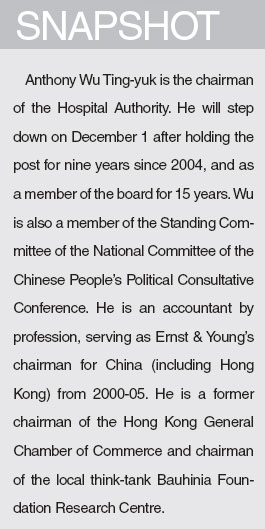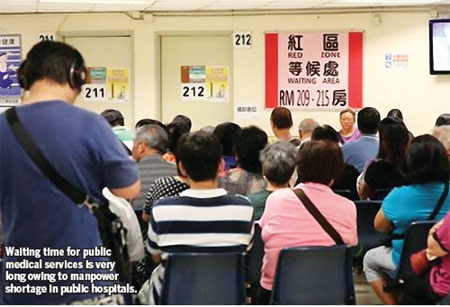Aging population prompts critical review
Updated: 2013-10-25 06:53
By Joseph Li(HK Edition)
|
|||||||||
Anthony Wu, outgoing chairman of the Hospital Authority, says his greatest hope is to improve service quality and shorten waiting times for patients, with a first-ever large-scale review that's underway. Joseph Li writes.
The thoroughgoing review of the Hospital Authority (HA) aims to evaluate how the organization has adjusted to changes in society; an aging population, and an increasing number of patients. Chief Executive Leung Chun-ying promised the review during the 2012 election campaign. It was part of his election manifesto. It was a timely call. The HA has not undergone a full-scale review since its founding in 1990, more than two decades ago.
The review is being undertaken by a steering committee under the chairmanship of Secretary for Food and Health Ko Wing-man. The review will examine governance, manpower, working hours, resource allocation and cost-effectiveness - how the HA could maintain a high standard of services under the dual track of public and private healthcare systems in Hong Kong.
Working side by side with Ko are medical practitioners, scholars, frontline health care staff, businessmen and patients' representatives. The HA chairman, Anthony Wu Ting-yuk, and chief executive officer, Leung Pak-yin, are ex-officio members.
The actual review will take about a year. Then the committee will prepare a report on its findings.

"This is the first time the government has initiated a large-scale review throughout the history of the HA," Wu told China Daily.
"But over the past years, the HA has, with the help of consultants, carried out reviews in the areas of corporate governance, relationship between the headquarters and the clusters, and medical risks.
"In view of the aging population and increasing young people catching chronic diseases, it is also necessary for the HA to examine its manpower and ancillary services to ensure the public healthcare system is sustainable."

A review of a large organization like the HA, requires that the committee hear the views of the experts and the public and come up with workable suggestions.
Wu says he is pleased with the broad representation on the steering committee.
But he offers no comment on why no similar review was undertaken during the term of the previous government as was the case with long-term housing strategy.
The steering committee has held its first meeting. It still must address prioritizing study areas. Wu, however, is most concerned with improving the standard of services and cutting the waiting time.
Owing to shortage of manpower, there are always very long queues of patients.
"We have tried every means to shorten the waiting time," he vowed. "For example, we have subsidized patients to have cataract operations done by private doctors, arranged patients to have treatments in other districts and provided special allowances to encourage doctors to work longer hours.
"We are short of more than 300 doctors but the supply of nurses has increased," he revealed. Apart from heavy workload, the doctors are unhappy because the consultation time for each patient is very short. Doctors hope they can spend 30 minutes with each patient but, in reality, only eight minutes are possible.
"The manpower shortage definitely affects the quality of service. The government needs to invest greater resources into the public healthcare system and it is worth doing so.
"In Hong Kong, we have a dual-track healthcare system. If there is a robust private healthcare system to take care of those who can afford it, it can alleviate the pressure on the public healthcare system and cut waiting time," he said.
Wu is optimistic that the recruitment of doctors will increase in the coming years. Whilst the Medical Council of Hong Kong has agreed to double the number of annual licentiate examinations for non-local medical graduates, the number of medical graduates from local universities will increase beginning in 2015.
The HA operates 42 hospitals. For administration purposes, seven clusters have been established on a district basis. Each cluster takes charge of the hospitals within its district. For many years, the clusters have been criticized as "independent empires".
Wu admits competition exists among the clusters but he hopes it is healthy competition.
To reduce the likelihood of hospital chief executives (HCE) building "independent empires" and staying in the same hospital for too long, a "musical chairs" system was introduced a few years ago to transfer HCE's after every six years.
"An HCE is expected to bring good ideas and a new mindset to a different hospital," he commented.
For 2013-14, government subvention is around HK$50 billion. Concerning resource allocation, Wu insists the existing mechanism is fair and transparent, with each cluster exactly knowing the level of resources the other clusters receive.
"I hold meetings to discuss allocation of resources with the CEO of the HA and the heads of the clusters," he disclosed. "For introduction of new services or major initiatives, consensus of other clusters must be reached without suspicion."
|
Anthony Wu points out that the Hospital Authority's manpower shortage definitely affects the quality of service, and the government needs to invest greater resources into the public healthcare system. Parker Zheng / China Daily |


(HK Edition 10/25/2013 page8)
